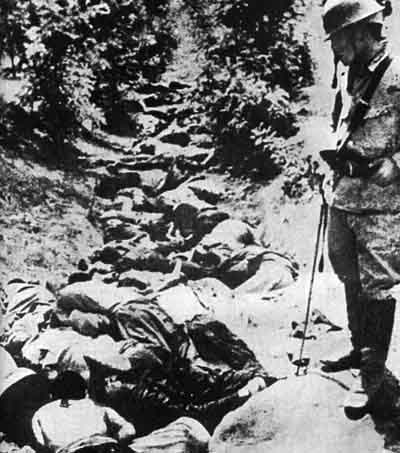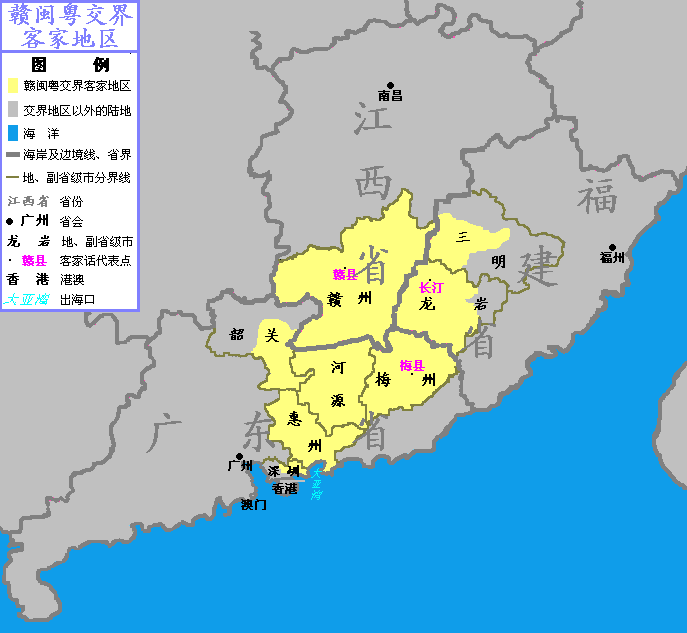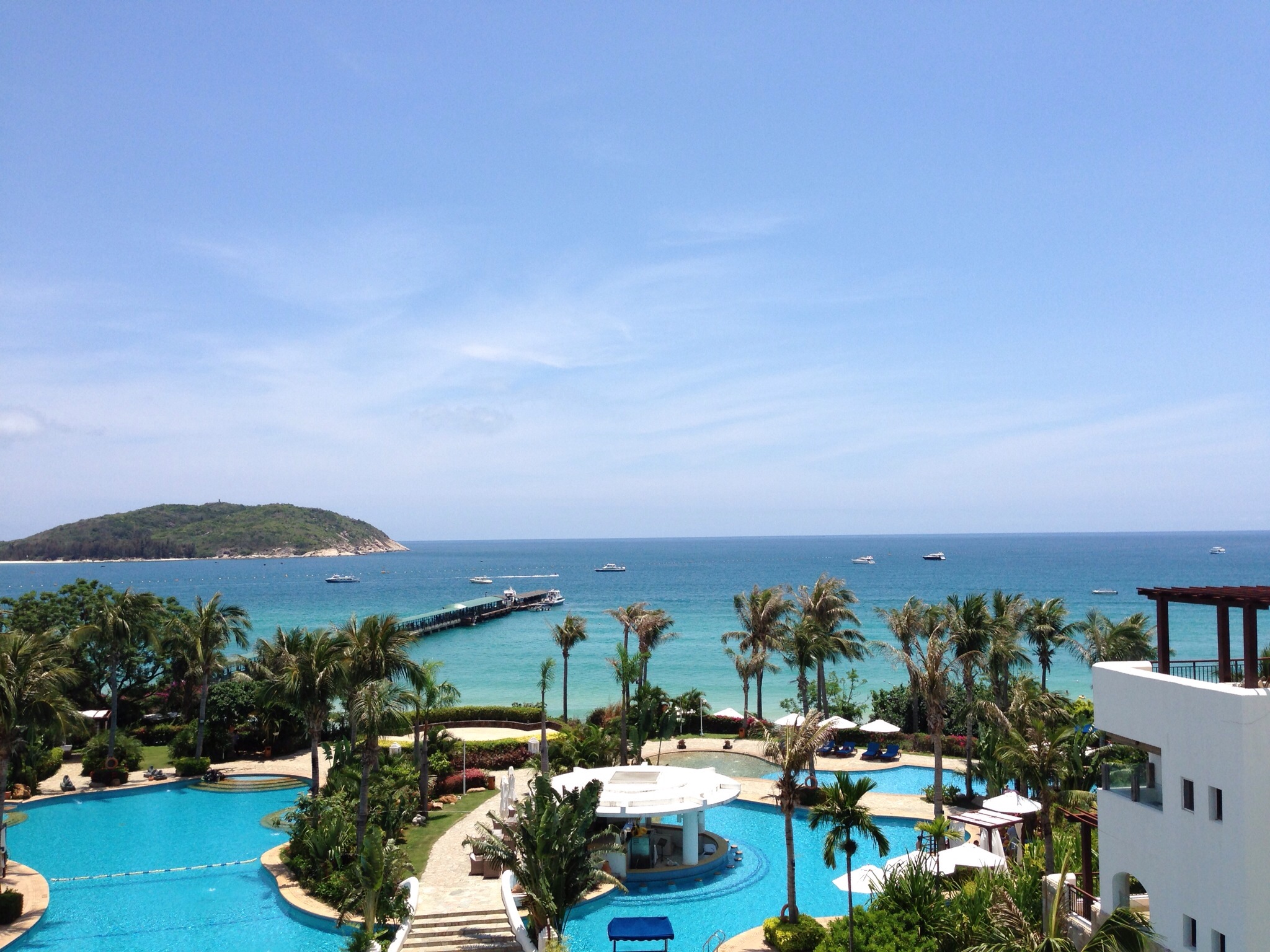|
Lin Shihong
Lin Shihong (林士弘) (died 622) was an agrarian king who rose against the rule of the Chinese Sui Dynasty near the end of Emperor Yang's reign. For several years, he controlled most of modern Jiangxi and Guangdong, but was then under attack by others, gradually reduced to fighting a guerrilla war against Tang Dynasty. He died in 622, and his followers scattered. Initial uprising Virtually nothing is known about Lin Shihong's background, other than that he was from Rao Province (饒州, roughly modern Shangrao, Jiangxi). In 616, he followed an agrarian rebel from the same locale, Cao Shiqi (), in rising against Sui Dynasty rule. Cao claimed the title of the Prince of Yuanxing and made Lin a major general. Later that year, Emperor Yang of Sui sent the official Liu Ziyi () to attack Cao, and Cao was killed by an arrow in battle. Lin took over Cao's troops and battled Liu at Lake Poyang, killing Liu in battle. Lin gained the allegiance of over 100,000 men. Around the n ... [...More Info...] [...Related Items...] OR: [Wikipedia] [Google] [Baidu] |
Zizhi Tongjian
''Zizhi Tongjian'' () is a pioneering reference work in Chinese historiography, published in 1084 AD during the Northern Song (960–1127), Northern Song dynasty in the form of a chronicle recording Chinese history from 403 BC to 959 AD, covering 16 dynasties and spanning almost 1400 years. The main text is arranged into 294 scrolls (''juan'' , equivalent to a chapter) totaling about 3 million Chinese characters. In 1065 AD, Emperor Yingzong of Song commissioned his official Sima Guang (1019–1086 AD) to lead a project to compile a universal history of China, and granted him funding and the authority to appoint his own staff. His team took 19 years to complete the work and in 1084 AD it was presented to Emperor Yingzong's successor Emperor Shenzong of Song. It was well-received and has proved to be immensely influential among both scholars and the general public. Endymion Wilkinson regards it as reference quality: "It had an enormous influence on la ... [...More Info...] [...Related Items...] OR: [Wikipedia] [Google] [Baidu] |
Xuzhou
Xuzhou (徐州), also known as Pengcheng (彭城) in ancient times, is a major city in northwestern Jiangsu province, China. The city, with a recorded population of 9,083,790 at the 2020 census (3,135,660 of which lived in the built-up area made of Quanshan, Gulou, Yunlong and Tongshan urban Districts and Jiawang District not being conurbated), is a national complex transport hub and an important gateway city in East China. Xuzhou is a central city of Huaihai Economic Zone and Xuzhou metropolitan area. Xuzhou is an important node city of the country's Belt and Road Initiative, and an international new energy base. Xuzhou has won titles such as the National City of Civility (全国文明城市) and the United Nations Habitat Scroll of Honour award. The city is designated as National Famous Historical and Cultural City since 1986 for its relics, especially the terracotta armies, the Mausoleums of the princes and the art of relief of Han dynasty. Xuzhou is a major city among t ... [...More Info...] [...Related Items...] OR: [Wikipedia] [Google] [Baidu] |
Ji'an
Ji'an () is a prefecture-level city situated in the central region of Jiangxi province of the People's Republic of China while bordering Hunan province to the west. It has an area of and as of the 2020 census, had a population of 4,469,176, of whom 643,399 live in the built-up (''or metro'') area made of 2 urban districts. Ji'an lies next to the Luoxiao Mountains () with the Gan River running through the middle of the city. Local dialects include a form of Gan Chinese (Jicha subgroup, ) as well as Hakka Chinese. Ji'an () is an abbreviation of its original name "" (). It has also formerly been known as Luling () and Jizhou (). Administration The Ji'an municipal region comprises two districts, a county-level city and ten counties. District * Jizhou District () * Qingyuan District () County-level city *Jinggangshan City () Counties * Ji'an County () * Jishui County () * Yongxin County () * Anfu County () * Xingan County () * Xiajiang County () * Yongfeng County () * Ta ... [...More Info...] [...Related Items...] OR: [Wikipedia] [Google] [Baidu] |
Huizhou
Huizhou ( zh, c= ) is a city in central-east Guangdong Province, China, forty-three miles north of Hong Kong. Huizhou borders the provincial capital of Guangzhou to the west, Shenzhen and Dongguan to the southwest, Shaoguan to the north, Heyuan to the northeast, Shanwei to the east, and Daya Bay of the South China Sea to the south. As of the 2020 census, the city has about 6,042,852 inhabitants and is administered as a prefecture-level city. Huizhou's core metropolitan area, which is within Huicheng and Huiyang Districts, is home to around 2,090,578 inhabitants. History During the Song dynasty, Huizhou was a prefectural capital of the Huiyang prefecture and the cultural center of the region. The West Lake in Huizhou was formerly known as Feng Lake. At the age of 59, Su Shi was exiled to Huizhou by the imperial government of Song. When he visited Feng Lake in Huizhou, he found it located in the west of the city and was as beautiful as West Lake in Hangzhou. Therefore, he ren ... [...More Info...] [...Related Items...] OR: [Wikipedia] [Google] [Baidu] |
Li Xiaogong
Li Xiaogong (591–640), posthumously known as Prince Yuan of Hejian, often referred to by his earlier title as the Prince of Zhao Commandery, was an imperial prince and general of the Tang dynasty. He was a son of a cousin of Emperor Gaozu (Li Yuan), the founder of the Tang dynasty, and served as a general under Emperor Gaozu. He defeated Emperor Gaozu's major competitors Xiao Xi and Fu Gongshi. He was one of the few generals of the early Tang dynasty who had already distinguished themselves in their careers before rising to prominence during the reign of Emperor Gaozu's successor, Emperor Taizong (Li Shimin). Background Li Xiaogong was born in 591, during the reign of Emperor Wen of Sui. His grandfather Li Wei (李蔚) was a son of the Western Wei general Li Hu (李虎), the grandfather of the major Sui general Li Yuan, and was a regional commandant during Sui's predecessor dynasty Northern Zhou. Li Xiaogong's father Li An (李安) was a general during Sui. Li Xiaogong wa ... [...More Info...] [...Related Items...] OR: [Wikipedia] [Google] [Baidu] |
Yunfu
Yunfu (), formerly romanized as Wanfow, and historically known as Dong'an (), which was formerly romanized as Tong On, from 1578 to 1913, is a prefecture-level city in western Guangdong province, People's Republic of China. It borders Zhaoqing to the north, Foshan to the east, Jiangmen to the southeast, Yangjiang to the south, Maoming to the southwest, and the autonomous region of Guangxi to the west. The city spans an area of , and has a population of 2,383,400 according to a 2021 publication by the city government. History The area of present-day Yunfu belonged to the Baiyue prior to the advent of the Qin dynasty, when much of Yunfu came under the jurisdiction of Guilin Commandery, while some of the area belonged to Nanhai Commandery. During portions of the Han dynasty, the area belonged to the kingdom of Nanyue. Following the fall of the Nanyue in 111 CE, the area of present-day Xinxing County was incorporated into the Western Han dynasty as Linyun County (). Jin dyn ... [...More Info...] [...Related Items...] OR: [Wikipedia] [Google] [Baidu] |
Yuwen Huaji
Yuwen Huaji (; died March 22, 619) was a Chinese military general, monarch, and politician of the Sui Dynasty who, in 618, led a coup against and murdered Emperor Yang of Sui. He subsequently declared Emperor Yang's nephew Yang Hao emperor and led Emperor Yang's elite Xiaoguo Army (驍果) north. However, he was then repeatedly defeated by Li Mi, Li Shentong (李神通), and finally Dou Jiande. Believing that his defeat was near and wanting to become emperor before his ultimate defeat, he poisoned Yang Hao and declared himself the emperor of a Xu state. Dou captured him in 619 and killed him. Background It is not known when Yuwen Huaji was born. He was the oldest son of the Sui Dynasty official Yuwen Shu, a close associate of Yang Guang the Prince of Jin, the son of Sui's founder Emperor Wen, and played a large role in helping Yang Guang displacing his older brother Yang Yong as Emperor Wen's crown prince in 600. Thereafter, Yuwen Huaji served as a guard commander fo ... [...More Info...] [...Related Items...] OR: [Wikipedia] [Google] [Baidu] |
Yangzhou
Yangzhou, postal romanization Yangchow, is a prefecture-level city in central Jiangsu Province (Suzhong), East China. Sitting on the north bank of the Yangtze, it borders the provincial capital Nanjing to the southwest, Huai'an to the north, Yancheng to the northeast, Taizhou to the east, and Zhenjiang across the river to the south. Its population was 4,414,681 at the 2010 census and its urban area is home to 2,146,980 inhabitants, including three urban districts, currently in the agglomeration. Historically, Yangzhou was one of the wealthiest cities in China, known at various periods for its great merchant families, poets, artists, and scholars. Its name (lit. "Rising Prefecture") refers to its former position as the capital of the ancient Yangzhou prefecture in imperial China. Yangzhou was one of the first cities to benefit from one of the earliest World Bank loans in China, used to construct Yangzhou thermal power station in 1994. Administration Currently, the pr ... [...More Info...] [...Related Items...] OR: [Wikipedia] [Google] [Baidu] |
Vietnam
Vietnam or Viet Nam ( vi, Việt Nam, ), officially the Socialist Republic of Vietnam,., group="n" is a country in Southeast Asia, at the eastern edge of mainland Southeast Asia, with an area of and population of 96 million, making it the world's sixteenth-most populous country. Vietnam borders China to the north, and Laos and Cambodia to the west. It shares maritime borders with Thailand through the Gulf of Thailand, and the Philippines, Indonesia, and Malaysia through the South China Sea. Its capital is Hanoi and its largest city is Ho Chi Minh City (commonly known as Saigon). Vietnam was inhabited by the Paleolithic age, with states established in the first millennium BC on the Red River Delta in modern-day northern Vietnam. The Han dynasty annexed Northern and Central Vietnam under Chinese rule from 111 BC, until the first dynasty emerged in 939. Successive monarchical dynasties absorbed Chinese influences through Confucianism and Buddhism, and ex ... [...More Info...] [...Related Items...] OR: [Wikipedia] [Google] [Baidu] |
Hainan
Hainan (, ; ) is the smallest and southernmost province of the People's Republic of China (PRC), consisting of various islands in the South China Sea. , the largest and most populous island in China,The island of Taiwan, which is slightly larger, is claimed but not controlled by the PRC. It is instead controlled by the Republic of China, a ''de facto'' separate country. makes up the vast majority (97%) of the province. The name means "south of the sea", reflecting the island's position south of the Qiongzhou Strait, which separates it from Leizhou Peninsula. The province has a land area of , of which Hainan the island is and the rest is over 200 islands scattered across three archipelagos: Zhongsha, Xisha and Nansha. It was part of Guangdong from 1950–88, after which it resumed as a top-tier entity and almost immediately made the largest Special Economic Zone by Deng Xiaoping as part of the then-ongoing Chinese economic reform program. Indigenous peoples lik ... [...More Info...] [...Related Items...] OR: [Wikipedia] [Google] [Baidu] |
Xiao Xian
Xiao Xian (蕭銑) (583–621) was a descendant of the imperial house of the Chinese dynasty Liang Dynasty, who rose against the rule of Sui Dynasty toward the end of the rule of Emperor Yang of Sui. He tried to revive Liang, and for several years appeared to be successful in doing so, as he, with his capital at Jiangling, ruled over a state that included most of modern Hubei, Hunan, Guangxi, and northern Vietnam. In 621, however, under an attack by the Tang Dynasty generals Li Jing and Li Xiaogong, he, not realizing that relief forces were approaching Jiangling, surrendered. He was subsequently taken to the Tang capital Chang'an, where Emperor Gaozu of Tang executed him. Background Xiao Xian was a great-grandson of Emperor Xuan of Western Liang, a vassal of Western Wei and Northern Zhou, who claimed Liang imperial title under the support from those states with his capital at Jiangling. His throne passed for two more generations, to Emperor Jing (Xiao Cong), until it w ... [...More Info...] [...Related Items...] OR: [Wikipedia] [Google] [Baidu] |
Ganzhou
Ganzhou (), alternately romanized as Kanchow, is a prefecture-level city in the south of Jiangxi province, China, bordering Fujian to the east, Guangdong to the south, and Hunan to the west. Its administrative seat is at Zhanggong District. History Early settlement and administration In 201 CE, Emperor Gaozu of Han established a county in the territory of modern Ganzhou. In 236 CE, during the Three Kingdoms period, the was established in the area. In the early years, Han Chinese settlement and authority in the area was minimal and largely restricted to the Gan River basin. The river, a tributary of the Yangtze via Poyang Lake, provided a route of communication from the north as well as irrigation for rice farming. Sui dynasty In 589 CE, during the Sui dynasty, the was abolished, and the area was reorganized as Qianzhou. During the Song, immigration from the north bolstered the local population and drove local aboriginal tribes into admixing with the nornterners. After the ... [...More Info...] [...Related Items...] OR: [Wikipedia] [Google] [Baidu] |








